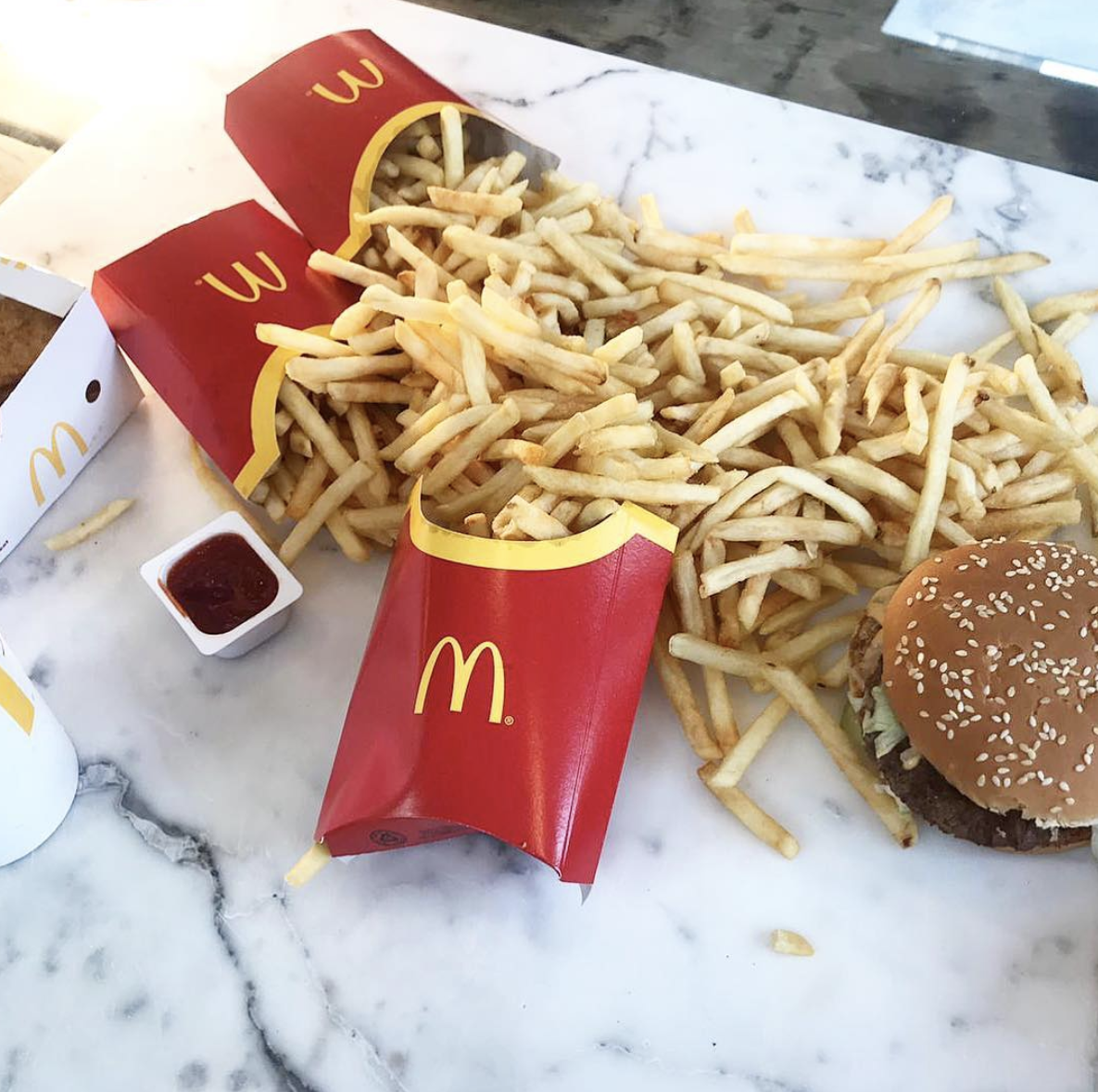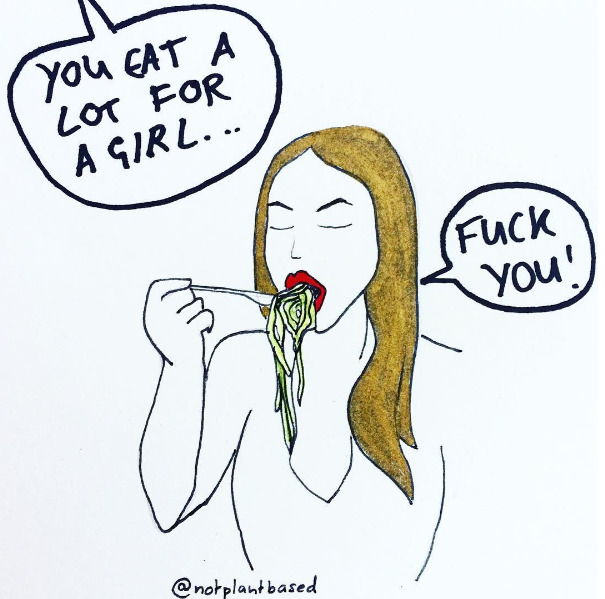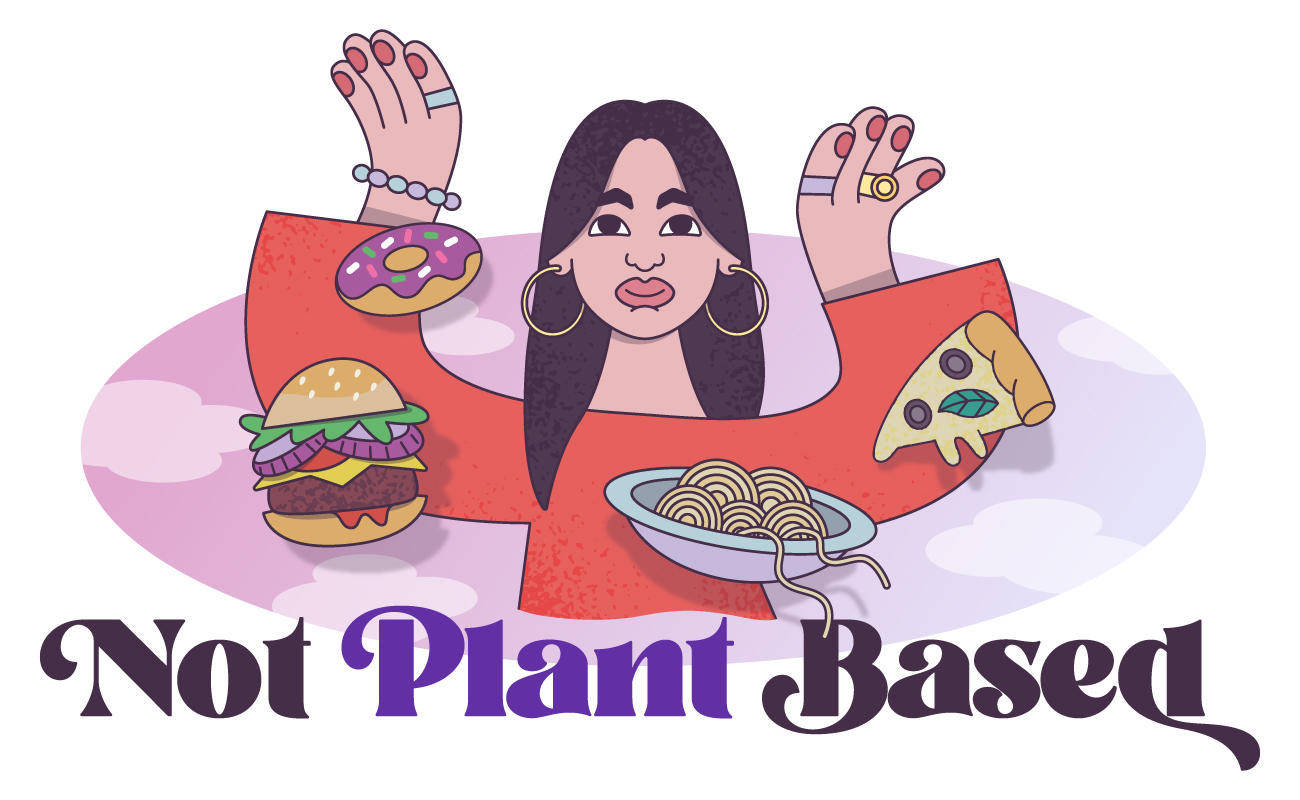
During my very first attempt at “eating healthy”, I believed that if I cut all of my meals in half it could only be a good thing…but after losing over a stone (and most of my mind) in one short month, it quickly became apparent to me that this method wasn’t quite working for me. Well, working for me in the sense of being able to function like a normal human being in my day to day life.
A gargling stomach and chest palpitations unfortunately became positive signals to my warped-eating-disorder-ridden brain that I was onto something great, rather than taking them for the natural hunger signals which were desperately trying to tell myself that I needed to eat more in order to survive. Long periods of restrictive eating and dieting can make it difficult to understand how much you should be eating day to day in order to live healthily. I know this is true, as I soon developed a problem with binge eating disorder once I allowed myself the freedom to cave into cravings after years of restriction.
I spoke to our resident dietitian and eating disorders specialist Ursula Philpot to help understand how we can know what size portions are best for each individual, and also so that she could dispel some portion myths.
Are portion sizes important in terms of good health?
“In terms of remaining a healthy weight portion size is reasonably important, but no more important than listening to fullness and hunger signals. However, if you are significantly either underweight or overweight, those signals become less reliable and sometimes you need to focus more on portion sizes.” Monitoring portions can be a good method in the short-term to help you learn to listen to those signals again.
Why do portions vary for different people?
“Obviously you can’t give a 2-year-old the same [portion] as a 30-year-old man.” It depends on genetics. “Some people do well on small portions and feel satisfied, but other people, they need more. Saying 2000 calories [a day] for women is a bit like saying everyone has size 5 feet and blue eyes. It’s an average.”
Ursula says that although it absolutely is true that women tend to eat less than men, there are occasions when the requirements are closer. For example, a 15-year-old girl will need more fuel as she’s still growing and a man in his 50s with a sedentary job might need less. Men tend to need more food generally as they are bigger and have a higher percentage of muscle mass, so need more calories to function.
Why am I hungrier some days than others?
People with eating disorders sometimes believe that the body must calculate calories on a second-by-second basis, but that isn’t true. “If you under eat, usually that deficit won’t kick in that day, or sometimes even the next day.” Ursula explains that men tend to recognise hunger more quickly, so if a man under eats in the morning he will probably be hungry by night time, but for women that often skips a day. I ask her why. “I don’t know, is the answer. But we know it happens.”

Will eating normally after dieting make you fat?
“Any period of dieting will up-regulate fat storage and appetite hormones, so there will be rebound to that and the rebound is often that you put on the weight you lost plus 10%. That extra 10% will then go in the next six months to a year, but what happens is that people go ‘oh my goodness, I’ve put on some weight and 10%, now I must diet, which means you end up in the same place you were before, but worse.”
If you’ve deprived yourself of a kind of food for a while – for example, carbs – then you are likely to over eat it when reintroducing it back into your diet, but as time goes on those extreme cravings should fade. “The lesson is: 1. Don’t strictly diet. 2. If you do want to increase your portions back up to normal, try your best to do it in a slower and more sensible way, rather than just letting the floodgates open.”
Are there any loose rules to follow when it comes to portion sizes?
“There are no hard and fast rules here.” It’s about saying ‘what’s right for me?’, given your family history, genetic make up and activity levels.
“As a general rule of thumb for your main meals, divide your plate into thirds visually. Go for a third carbs, a third protein and a third fruit and vegetables.” But that varies on an individual basis. If you are very sporty, you might add extra carbs, or if you are very overweight you might bump up the vegetables. “What you do at snacks and at other times, I’m not so fussed about, but if you get your main meals about right that’s the main thing.” Try to have fruit and vegetables with every meal, but don’t bother adding a side salad to a sausage sandwich just for the sake of it.
How much fruit and veg should we eat a day?
“Five is what we are looking for. Most people don’t get five, so trying to get up to five would be a good idea. Between five and seven, but it doesn’t come at the expense of other nutrients in your diet.” In other words, you shouldn’t have a salad everyday if it means you won’t have carbohydrates. They shouldn’t act as substitutes for one another. “It’s all about balance really.”
Is eating little and often best?
It’s very individual and Ursula says there are endless debates surrounding this question. “For some people they do better on small regular meals. But for other people, they seem to do better on three meals, or even two meals a day.” There is no one right answer. It’s about listening to your body and finding out when you function best. “It used to be in the 70s that you ate everything on your plate, but that’s not a great way to tune into portion control.”




Hi! I’m confused, what do you really support or do you like just quoting other peoples words and not giving your opinion? Because I got the idea that you were body positive but then you quote this dietitian and she says thet if you do lots of sport you should eat carb but if you are overweight you should eat more vegetables. isnt that just another diet? another rule? i came to this page for advise on binge eating disorder and intuitive eating but this made me feel like if i’m overweight i should start restricting again.
Author
Hi Luciana! I would certainly not feel comfortable giving my opinion on the topic of portion control…that’s why we asked Ursula, who is an eating disorders specialist.
It’s not meant to be a rule, just to say that generally, you tend to eat more if you do more sport and that you should try to eat more vegetables if you are trying to lose weight – no reference to deprevation, mind.
Certainly not rules! Just the opinion of an expert. Hope that helps?